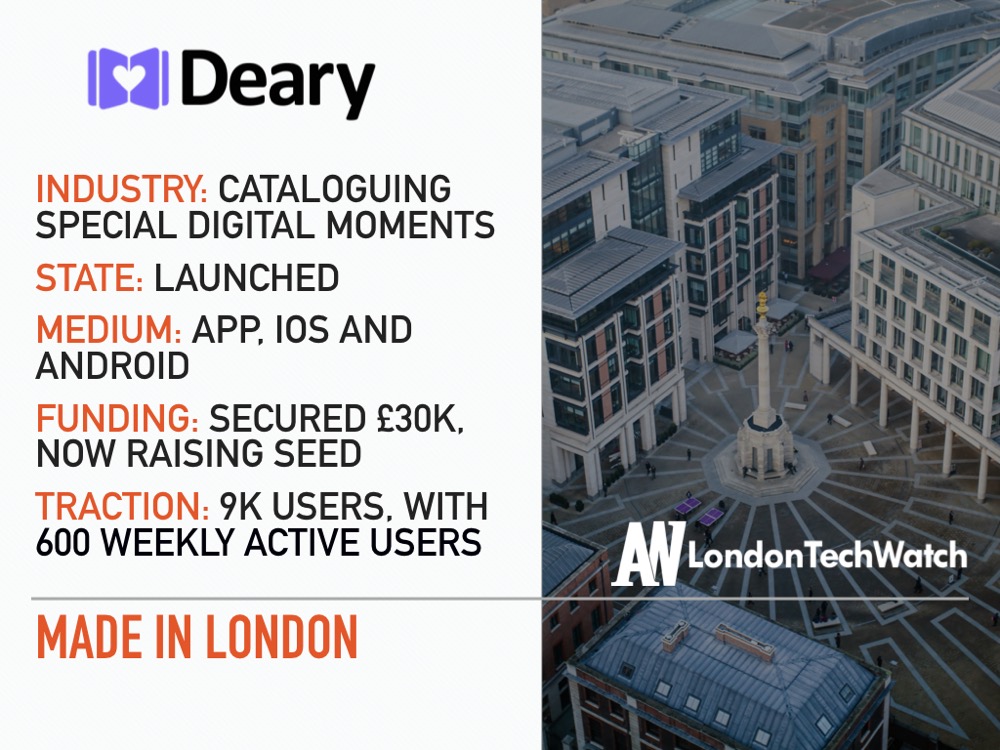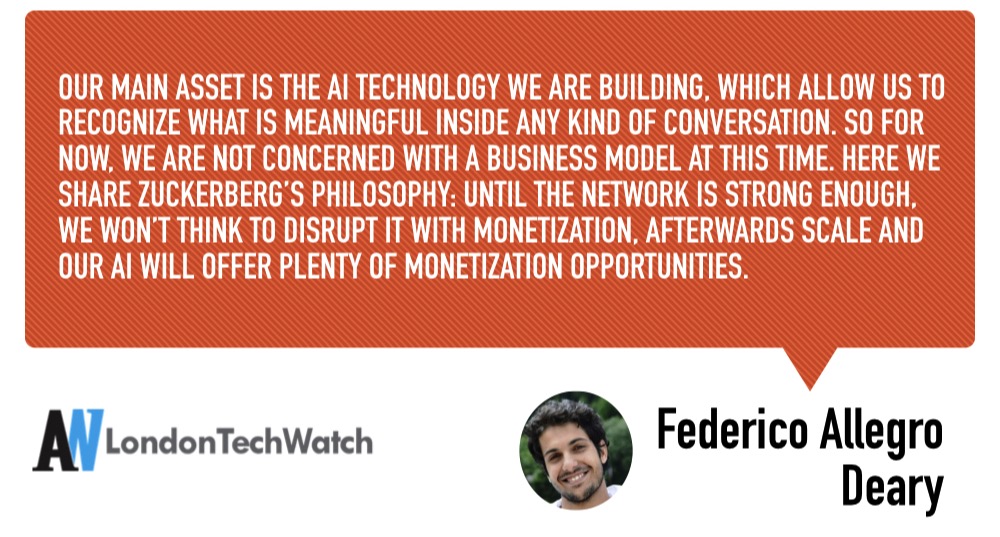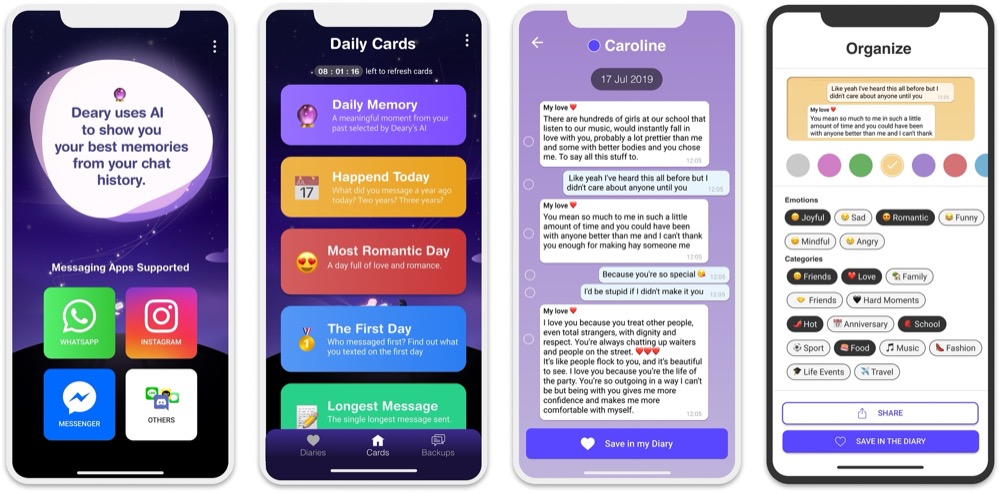It’s difficult to manage a long-distance relationship; even though people can use social media, video chat, and instant messaging to stay in touch, they are constantly combatting the loss of connection. Deary is the first app that uses AI to discover emotional sentiment in your chat-messages and transform them into a story. Deary brings people closer together by unlocking the human value in chat-messages and presents users with ‘Message Cards’ that contain a day’s worth of messages. Deary’s AI analyses messages from various chat platforms such as Whatsapp, FB messenger, and Messages and chooses which messages to include based on their emotional value. Deary has already processed 3.2 million chat-messages and retrieved 63.7K meaningful messages since its launch.
London TechWatch chatted with Cofounder and CEO Federico Allegro to understand how navigating his long-distance relationship inspired the creation of Deary, the company’s experience building in London, and future plans.
Tell us about the product or service Deary offers.
Deary is the first app that uses AI to show your memories in a new way, taking advantage of the untapped potential in our messages. The app enables users to rediscover their best memories from their chat-histories. With no hassle and for free, just import your chat and start reminiscing.
 Tell us a little about your background and what inspired the business?
Tell us a little about your background and what inspired the business?
For 3 years, I had been in a long-distance relationship. I was in Canada and my girlfriend was in Korea. During that period, we exchanged almost 500K+ messages. I realized how much of our lives were lost inside our chat-history, basically most of our memories together.
I started wondering – Why is it that we have all these devices recording our lives, but we have no way to get some value out of our data? So, I decided to move to London with my University friends to build a way to rediscover that lost value.
Note – We are married now so if I could make that work, a startup should be easy!
How is Deary different?
Our AI is what enables us to create a unique daily experience. Each day users are presented with ‘Message Cards’ that contain a day’s worth of messages. The AI selects these based on their emotional value – we call this meaningfulness.
Deary creates daily opportunities for a “hit” of nostalgia and the possibility for reflection. By focusing on the past, Deary incentivizes a daily pause for self-care. Contrary to current social networks focused on sucking in their users for a maximum amount of time while providing an empty value to their lives. Deary strives to bring you closer to your past and to yourself.
What market is Deary attacking and how big is it?
There are a few ways to think of our market size:
- Remembering is a human need, maybe it was developed as a defence mechanism but now it powers our pursuit for self-documentation. Just think of how many times you’ve taken a photo in the last week. Messages do the same but go further by capturing the context of that moment. So, we’d say everybody that enjoys looking at old photos could be interested in looking at their old messages; they just not had a way to do it until now.
- Another way is to think of the number of people that use messaging apps. There are about 4.9B and most of these use the app daily. We’ve calculated based on our user’s data that by the time you are 35 (younger for gen Z), you have about 1M messages in your phone, that’s a lot of memories to look through. There are currently about 1.2B people in the world in this group.
TL;DR: The memories market is big and our Meaningfulness AI is what is going to unlock it.
What is the business model?
Our main asset is the AI technology we are building, which allow us to recognize what is meaningful inside any kind of conversation. So for now, we are not concerned with a business model at this time. Here we share Zuckerberg’s philosophy – until the network is strong enough, we won’t think to disrupt it with monetization, afterwards scale and our AI will offer plenty of monetization opportunities.
How has COVID-19 impacted the business?
We launched right before Coronavirus hit hard, but since then our users have imported 250 million messages over the past 7 months with £0 ad spend. These numbers reflect the strong user interest in accessing their memories.
In an era of social distance, physical contact is reduced to a minimum so people were looking for anything that would get them closer to others. Deary was a clear pick, so it has impacted us positively. It allows our users to connect with others over your shared memories, conveniently stored in your chat history. COVID-19 helped us prove the power of memories in helping humans to connect.
Tell us what building your company in London has been like?
We moved here to build this company, there is not much more to our London experience. So for us, the question is more like – ‘Tell us what ‘living’ in London has been like?’ The answer to that is HARD! Luca, our CTO, had to live off £700 a month for a while we figured out how to survive in London while building a company. But lessons were learned, and we are now much better at budgeting!
The best thing about London is the density of people with similar interest to you, something places like the suburbs of Venice have very little of. Leveraging this has allowed us to meet some great people that have helped us a lot.
What are the milestones that you plan to achieve within six months?
We are focused on growth. From talking to competitors/others in the space, we know that the way to crack the memories space is with viral content driving downloads. So, we are working on some more sharable content (stay tuned!) and on leveraging the network effect in messaging apps to acquire more users, fast and for free.
If you could be put in touch with one person in the London Tech community who would it be and why?
Dan Snow, he’s a popular TV historian. He started a Netflix-style streaming service called HistoryHit, which he recently sold. I’d like to chat to him because of his clear interest in the past, so he’s a possible user (every download counts!) Additionally, he built a user base with more 100,000 people that are interested in the past, for us that’s a pool of possible users we want to tap.
What does being “Made in London” mean to you and your company?
With an all international team, the “Made in London” is the embodiment of the dream we left home for. We’ve got a lot of opportunities from London and we hope we can pass that on to other risking it all here.
With an all international team, the “Made in London” is the embodiment of the dream we left home for. We’ve got a lot of opportunities from London and we hope we can pass that on to other risking it all here.
What else can be done to promote early-stage entrepreneurship in London?
Diversification! The London early-stage ecosystem is heavily skewed towards some types of startups (Fintech, HealthTech, Cyber, etc). When we look around, we don’t fit in a lot of the groups/investors/accelerators. In the interest of establishing London as a startup hub for the long term, diversifying these verticals is key, so that London can attract more of the best ideas out there.
What is your favorite restaurant in London?
I’m Italian so I must to say an Italian Pizzeria! My choice has to be O’Ver in London Bridge. However, when it comes to a late night in the office Domino’s is our choice, and the delivery is often early which makes the whole thing even tastier!
You are seconds away from signing up for the hottest list in London Tech! Join the millions and keep up with the stories shaping entrepreneurship. Sign up today






